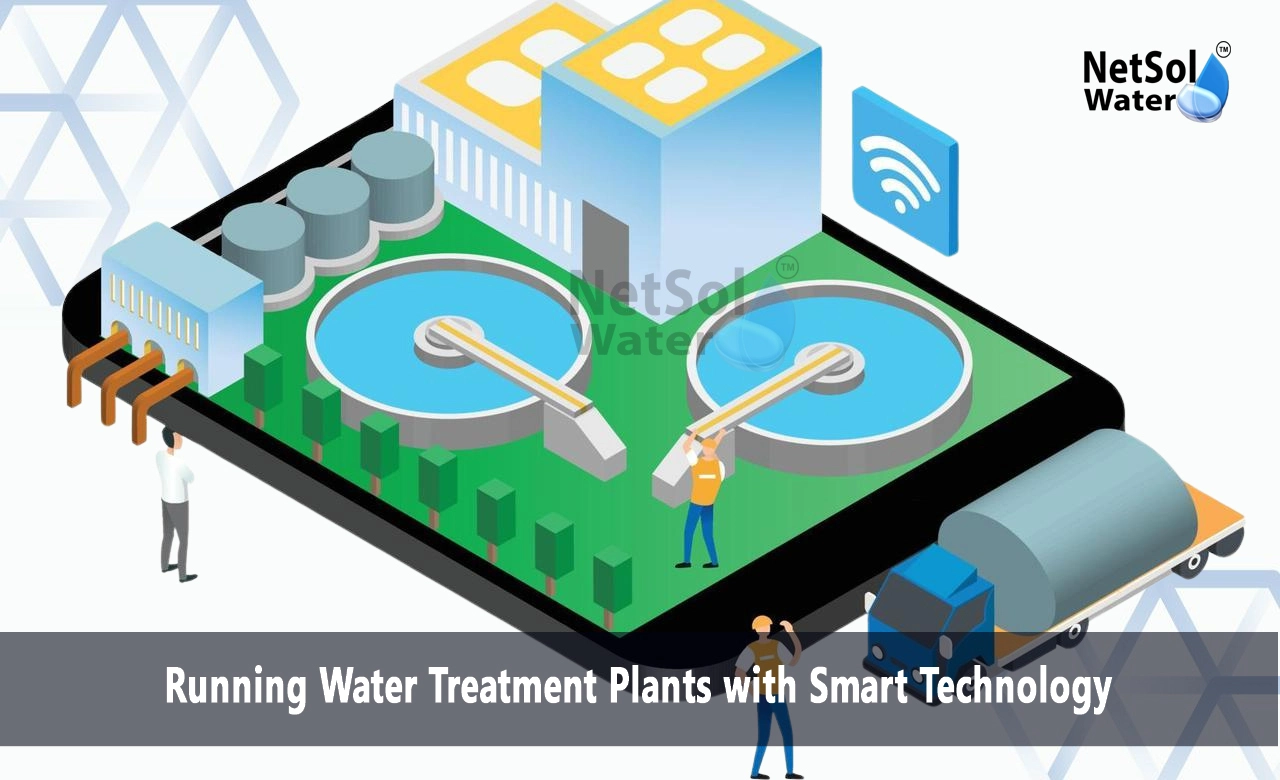The foundation of balanced communities together with growing commercial activities depends on pure water supply. The rising needs of water demand combined with old infrastructure systems and water contamination issues turn water treatment procedures into complex processes. Water treatment plants experience revolutionary changes through implementation of smart technology. Smart technology implementation with IoT sensors along with AI and automation enables water treatment plants to increase operational efficiency while reducing costs while ensuring security standards in water quality.
We will examines how smart technology transforms RO plants into advanced intelligent operations able to meet future requirements.
How does Smart Technology Operate in Water Treatment Plants?
Real-time monitoring and analysis and optimization of water treatment processes occurs through the digital implementations of smart technology. The technology provides plants with both "nervous system" and "a brain." Key components include:
· IoT Sensors: Devices known as IoT Sensors serve as data collection tools which measure components such as pH and turbidity and pressure.
· AI & Machine Learning: Through AI and Machine Learning algorithms systems automatically anticipate failures and provide solutions.
· Automation: Systems that adjust pumps, valves, or chemical dosing without human input.
· Cloud Platforms: Central dashboards to track performance remotely.
Together, these tools make plants faster, more accurate, and less reliant on manual work.
How Smart Technology Enhances Water Treatment Plants?
Real-Time Monitoring with IoT Sensors
IoT sensors are the eyes and ears of a smart plant. They track critical parameters 24/7:
· Water Quality: pH, chlorine levels, dissolved oxygen.
· Equipment Health: Pump vibrations, filter pressure, motor temperature.
· Flow Rates: Volume of water entering or leaving the plant.
For example, a turbidity sensor can detect sudden muddiness in raw water and trigger filters to work harder. This prevents contaminants from slipping through.
Predictive Maintenance
Traditional plants fix equipment only after it breaks. Smart plants use AI to predict failures before they happen.
· Vibration sensors on pumps detect unusual patterns, signaling wear and tear.
· Machine learning analyzes historical data to forecast when membranes in RO plants need cleaning or replacement.
This cuts downtime and repair costs by up to 30%.
Energy Efficiency
Water treatment uses massive energy, especially in RO plants. Smart tech optimizes power use:
· AI adjusts pump speeds based on real-time demand, saving energy.
· Solar-powered sensors reduce grid reliance in remote plants.
· Smart meters track energy use and highlight waste areas.
A study showed smart systems can cut energy costs by 20–25% in RO plants.
Automated Chemical Dosing
Over-dosing chemicals wastes money; under-dosing risks unsafe water. Smart systems solve this:
· Sensors measure contaminant levels and calculate exact chemical needs.
· Automated dispensers release precise amounts of chlorine, coagulants, or antiscalants.
This ensures compliance with safety standards while reducing chemical costs.
Remote Control & Alerts
· Plant managers can monitor operations from anywhere via smartphones or computers. If a sensor detects a leak or a spike in toxins, it sends instant alerts. This allows quick fixes, even in off-hours.
A Closer Look into Smart Technology in RO Plants
Reverse Osmosis (RO) is a high-pressure process that removes salts, metals, and microbes. While effective, it’s energy-heavy and sensitive to feedwater changes. Smart tech addresses these challenges:
Optimizing Membrane Performance
RO membranes clog over time, raising energy use. Smart systems track:
· Pressure differences across membranes.
· Salt rejection rates.
· Flow rates.
AI predicts when to clean or replace membranes, ensuring peak efficiency.
Adaptive Energy Use
RO pumps consume 40–50% of a plant’s energy. Smart controllers adjust pump speeds based on:
· Real-time water demand.
· Electricity prices (e.g., slower pumping during peak tariff hours).
Feedwater Quality Adjustments
If IoT sensors detect changes in feedwater (e.g., higher salinity), the system automatically:
· Adjusts pretreatment steps (e.g., adding antiscalants).
· Modifies pressure levels to protect membranes.
Reducing Water Waste
RO plants discard 20–50% of water as brine. Smart tech minimizes waste by:
· Recycling brine for other uses (e.g., cleaning filters).
· Optimizing recovery rates based on feedwater quality.
Benefits of Smart Water Treatment Plants
· Lower Costs: Save energy, chemicals, and labor.
· Faster Response: Fix issues before they escalate.
· Sustainability: Reduce waste and carbon footprint.
· Compliance: Meet strict water quality regulations effortlessly.
· Scalability: Adapt to growing demand or new contaminants.
Challenges and Solutions
|
Challenge |
Smart Solution |
|
High upfront costs |
Government grants or phased upgrades. |
|
Cybersecurity risks |
Robust encryption and access controls. |
|
Staff training gaps |
Digital literacy programs for workers. |
What is the Future of Smart Water Treatment
· Digital Twins: Virtual replicas of plants to simulate scenarios and test upgrades.
· Blockchain: Secure, transparent data sharing between utilities and regulators.
· AI-Driven Desalination: RO plants that adapt to seawater changes in real time.
Conclusion
Modern water treatment plants need smart technology to function properly. These technologies combining IoT with AI features enable contamination prevention while the AI-managed RO plants reduce both cost and energy consumption to improve water safety and environmental impact. Increasing resource demands from climate change and population growth require smart tech implementation because it stands between industry survival and extinction.
Utilities and governments must invest in smart water infrastructure. The future of clean water depends on innovation today.
Do you need an advice or assistance on selecting the best water and waste water treatment unit? We have solutions for all your problems!
Let us know your problem, our experts will make sure that it goes away.
For an assistance or related query,
Call on +91-965-060-8473 Or write us at enquiry@netsolwater.com



